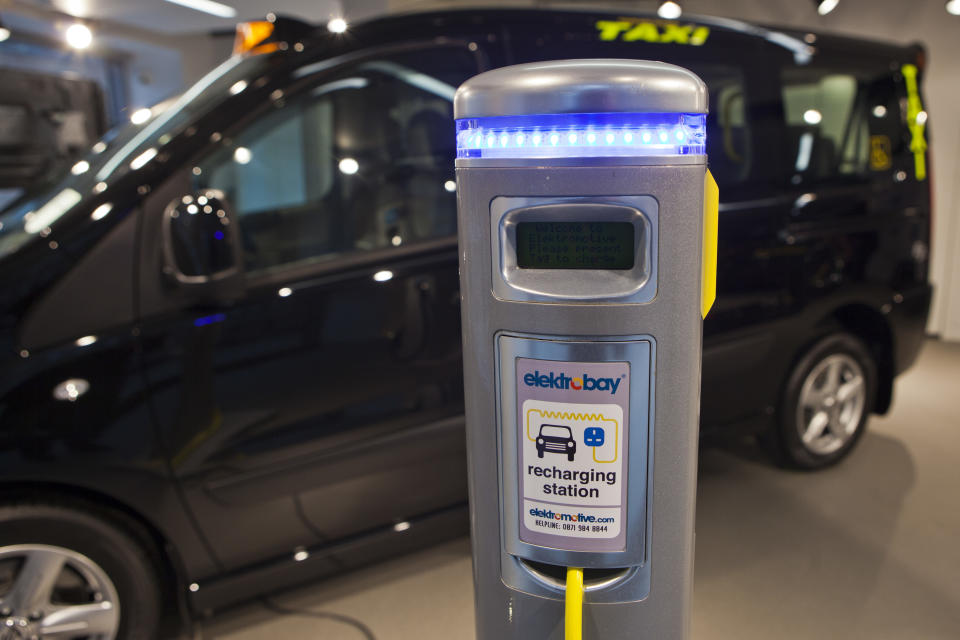Inventor of UK's first car charging ports sues BP subsidiary for £1m in shares row

A subsidiary of oil giant BP (BP.L) was on Wednesday accused at a tribunal of refusing to hand over £1m ($1.21m) worth of share options allegedly owed to an inventor who built the first car charging ports in the UK.
The inventor, Calvey Taylor-Haw, claims that he was set up to fail and unfairly dismissed by Chargemaster, a car-charging infrastructure company that BP acquired for £130m in July 2018.
He told the Watford Employment Tribunal the company had promised him that he could keep the share options, which were then worth around £690,000.
Former Chargemaster CEO David Martell told the tribunal that Taylor-Haw’s role in the company was sales-focused, and that he had been made redundant because he failed to meet targets and was being paid significantly more than other salespeople.
On Wednesday at the tribunal, Martell also denied that he had promised Taylor-Haw that his options would be “safe” if the inventor was made redundant.
Taylor-Haw told the tribunal that Martell made the promise in two meetings, one on 11 September 2017, and another on 3 May 2018.
He said that the agreement was broken because Chargemaster wanted to reduce the price BP would have to pay to acquire the company.
But Martell said that Taylor-Haw first broached the issue of share options after the BP acquisition had been announced in July 2018.
He suggested that Taylor-Haw had not raised the matter earlier because an acquisition — which would have allowed him to cash in his options — was not expected.
“If he had been concerned about share options, he would have mentioned it in a letter,” Martell said in the tribunal.
Missing laptop

Martell claimed that a laptop containing typed notes of the 11 September 2017 meeting has disappeared since Chargemaster moved premises.
But before it went missing, Martell said that he discovered the notes, which were contained in a larger “aide memoire” document, in August 2018 — almost a year later.
He then copy and pasted those notes into new word documents, he said. Those notes in the new documents do not reference a promise regarding share options.
However, he told the tribunal that he does not have the original notes he claims to have found a year ago, because the laptop on which they were stored “ceased to be reliable.”
“I don’t know what happened to it,” he said.
He told the tribunal it was “not correct” to say that August 2018 was the first time that the notes had been typed up.
Handwritten notes relating to a different September 2017 meeting have also been produced by Martell, even though he had told his personal assistant in August 2018 that “no meeting notes seem to have been made,” the tribunal heard.
Asked why he had not taken more detailed notes during the redundancy process, Martell told the tribunal that he had not thought the situation was “contentious” — and claimed that Taylor-Hawe had “accepted the redundancy was being conducted in a proper way.”
‘Set up to fail’

Taylor-Haw, who joined Chargemaster when it acquired his company Elektromotive in 2017, claims that he was set up to fail as part of a “purported redundancy situation.”
There was a “failure to follow due process,” he claims, and no reasonable attempt to find alternative employment for him.
Martell claimed at the tribunal that Chargemaster was “bleeding cash” as a result of the Elektromotive acquisition, and that the company informed the inventor that his role was not sustainable in the long-term.
Though Taylor-Haw, who was given the title “director of partnerships,” claims that he had a business development role, Martell told the tribunal that there was little distinction between sales and business development roles in a company the size of Chargemaster.
Taylor-Haw claims that developing business relationships was “complex” and “would require months of work with a client before the work is delivered.”
The inventor told the tribunal that he had no job description — something Martell said was not unusual — and was never formally allocated sales targets, and was not given access to sales data.
This is “surprising”, the inventor said, if he did work in a sales role.
Martell said that “targets were agreed” and that Taylor-Haw had been “enthusiastic” about getting out on the road to sell the company’s products.
‘Nothing sinister’ about role change
Asked by Alice Carse, the lawyer for Taylor-Haw, whether getting her client out of the office was part of a “deliberate strategy” to exclude him from the day-to-day running of the business, Martell said there was “nothing sinister” about the move.
During initial legal filings in the case, Taylor-Haw claimed he had brought in £145,000 in sales over five months as director of partnerships, the tribunal heard.
This was “completely wrong”, Martell said, noting that the financial director of the company had identified only £32,000 in sales in that period.
His role was eliminated, Martell said, because other salespeople were on “vastly lower” salaries.
No suitable alternative position could be found within Chargemaster or the wider BP group, Martell said — either because those available were too junior or required qualifications or experience that Taylor-Haw did not have.
After serving out a 12-month notice on his redundancy, Taylor-Haw left his post in October 2018, three months after the BP acquisition.
Taylor-Haw, who introduced the first commercial car charging points in London in 2005, will be in the dock on Thursday, when a decision is also expected in the case.

 Yahoo Finance
Yahoo Finance 